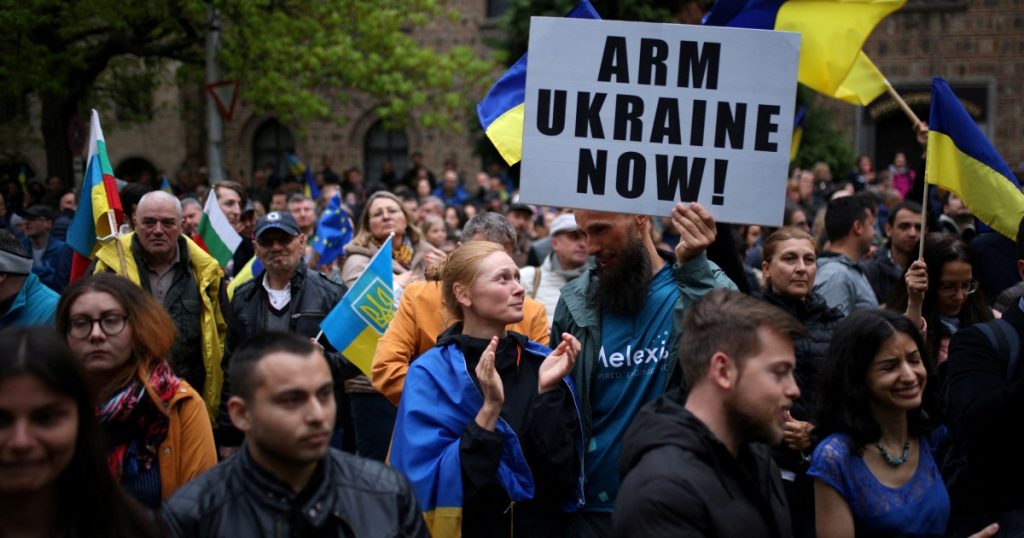
Last week, Bulgaria and Poland became the first European victims of Russian gas sanctions when Moscow cut supplies to the two countries.
Earlier, Bulgaria’s state-owned energy company, Bulgargaz, said the terms proposed by Russian energy giant Gazprom were a breach of contract – and refused to pay for the resource in rubles as stipulated by Russian President Vladimir Putin.
Fortunately for Bulgaria, gas makes up only 6% of its total energy consumption, but the move was taken as a warning for the rest of the union, especially for larger consumers like Germany and Italy.
More than just the loss of power supplies, the cuts have reinforced the growing separation between longtime allies, who share an alphabet, religion and former communist rule.
Their relationship began to converge in 1877, when Russia aided the uprising of Bulgaria against five centuries of Ottoman rule.
But with the Russian invasion of Ukraine, that special relationship came into question.
Days after Russian tanks entered Ukraine on February 24, Alpha Research, a Bulgarian social research agency, published the results of a nationwide survey on how ordinary Bulgarians felt about the war.
After only four days of hostilities, Putin, who for many years enjoyed a positive assessment in the country, lost more than half of his popularity, with 25% of the people approving of him against 55% in 2021.
In addition, 63 percent of respondents agreed that Bulgaria’s place was in an alliance with the European Union and NATO, compared to 15 percent who support taking sides with Russia.
“The data show that Bulgarian society is going through a period of transformation, which will have an impact not only on geopolitical situations, but also on the support of individual political forces in the country,” said Alpha Research.
For a long time, Moscow’s attitude towards Sofia was disrespectful, said Vasyl Dimitrov, 60, a conservative restorationist, with Russia’s ambassador to Bulgaria Eleonora Mitrofanova calling pro-Ukraine “Western pillars”.
Dimitrov did not trust Putin after Russia’s annexation of Crimea. Now, he’s ready to pay more for gas.
“Are we going to let him kill children with gas?” Asked. “We haven’t seen atrocities like this in Europe since the time of Hitler.”
On Wednesday, the Bulgarian parliament will vote again on whether to send weapons to Ukraine – a disputed topic, given the shaky political alliance of the four parties.
The Socialists threatened to secede from the government if Bulgaria sent arms, while the Democrats warned of similar consequences if the country did not.
On April 28, Bulgarian Prime Minister Kirill Petkov traveled to Kyiv to meet with Ukrainian President Volodymyr Zelensky, and pledged that his party, We Continue to Change, would support military assistance, a day after Russia cut off gas to Bulgaria.
“The rhetoric we’ve been hearing for several months is ‘Do not provide military assistance to Ukraine until peace comes sooner,'” Petkov told local media, referring to voices from within the coalition. If this is the price of peace, if the Russian state continues to do so. [attack] And no one has a chance to defend himself, so do we want this peace? “
Lyubin Rossinov, 78, a retiree from Plovdiv, Bulgaria’s second-largest city, said Sofia should have ditched Russian gas long ago, given decades of lopsided gas deals, in which Russia held the country’s market.
While he is happy to see support for Ukraine rising, he is concerned that pro-Russia propaganda in the biggest news outlets remains high.
“The non-independent media, of which there are many in Bulgaria, are dividing people about the war and most notably casting the prime minister in a negative light,” Russinov said.
“Bulgarians like me hate Putin and the Russian leadership, but no one is against the Russian people.”
But Biba Petrova, 60, who until recently worked at an arms factory in central Bulgaria, said: “We, the Russians, realize that it is not Russia that is at fault in this war, but that it is NATO that provoked it.”
She believes Petkov’s political priorities are skewed because his government provides Ukrainian refugees 40 lev ($22) a day, while most of his citizens are “starving.”
Bulgaria has the lowest gross domestic product (GDP) in the European Union.
“It is the government’s mistake in provoking the Russian president to cut off gas supplies,” Petrova said of the gas cut.
In general, Daniil Smilov, program director of the Center for Liberal Strategies in Sofia, said that most Bulgarians support Ukraine, given that they opened their homes and volunteered time to welcome them.
“The dominant voices are not anti-Ukrainian,” he said.
Smilov added that the real challenge is to coordinate the position of the Bulgarian government.
Not only did the war break ties within the four-party coalition, but it also shattered the union between the country’s liberal prime minister and socialist president, Rumen Radev, who is seen as pro-Russia.
“Unlike the Russian parties within the coalition, the president has broad support among the Bulgarian public,” Smilov said. If he continues to disagree on the prime minister’s rhetoric, it will lead to further polarization and not be good for the country.




More Stories
Journalists convicted in Hong Kong sedition case
Stand News: Hong Kong journalists convicted of sedition in case critics say highlights erosion of press freedom
Shark decapitates teen off Jamaica coast